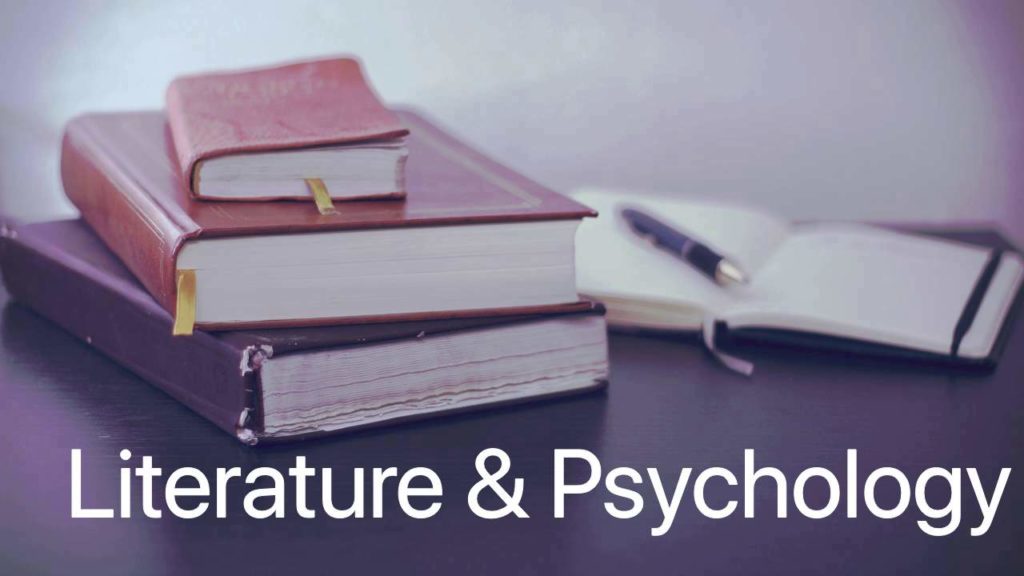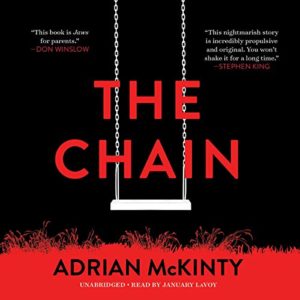Imagine a phone call featuring an electronic voice telling you that your child has been kidnapped and you need to pull together some huge sum of money to get the child back unharmed. I used to think that would be one of the most horrifying calls parents could ever receive.
But I was wrong, as I learned when I read The Chain by Adrian McKinty. In that novel the call that Rachel Klein receives doesn’t simply demand money. In order to get her daughter Kylie back, Rachel most pay a ransom AND kidnap another child to take Kylie’s place. Rachel must become a monster who inflicts pain on another family in order to save her own. Watching Rachel’s transformation into that monster was a painful experience, yet I had no doubt that, in the same situation, I would do exactly the same thing.
McKinty, Adrian. The Chain
unabridged audiobook
Hachette Audio, 2019
ISBN 9781549183416
Recommended
Kidnapping is a standard trope of the thriller genre, but McKinty’s addition of the chain aspect, forcing a basically good person to do something unquestionably bad, is a brilliant psychological plot twist. I could imagine a writer thinking “Having your child kidnapped is an awful experience, but what would make that experience even worse?” Having the insight to imagine that scenario in a novel is the mark of a good writer.
But wait, there’s more. How would the protagonist who transformed herself into the monster who could plan and carry out the kidnapping of another child react to what she had done? I’m pretty sure that if I had managed to get my own child back safely, I’d probably keep my head down and hope that I never got caught.
But Rachel Klein is stronger than I. She decides that the people behind the chain must be stopped so that never again will anybody have to go through what she has experienced.
The second section of The Chain details Rachel’s investigation and pursuit of the behind-the-scenes culprits. This second section is not nearly as good as the first part. The villains are so over-the-top that they quickly become comic caricatures, and the plot soon ratchets up into high melodrama.
Yet, despite these shortcomings, I give McKinty credit for the effort of examining fully the character of Rachel Klein. The Chain would have been a good enough thriller with only the story of how Rachel saves Kylie, but the effort of the second part, the effort to go deeper into Rachel’s motivation and characterization, raises my overall evaluation of the novel.
It’s the psychological aspects of literature that have always most fascinated me. I don’t just want to see what people do in certain situations; I want to understand why they choose to do what they do instead of doing something else. For me, characterization is always more important than plot, although characterization and plot are inextricably intertwined.
No matter what twisted situations they may find themselves in, people do what they do because of who they are.
Because of this interest in why people do what they do, learning about psychology has, over the years, helped me to understand and fully appreciate how fiction portrays the workings of the human mind and heart. To illustrate what I mean, here are five articles I’ve come across recently that fascinated and informed me.
Sunday Reading: The Psychological Realm
The April 4, 2021, issue of The New Yorker features “ a selection of pieces on the mysteries and intricacies of psychoanalysis.” This is the portal page for the collection, where you’ll find links to the following stories:
- “The Impossible Profession,” published in 1980, in which Janet Malcolm profiles an engaging psychoanalyst practicing in Manhattan and examines the history of the profession.
- “God Knows Where I Am,” in which Rachel Aviv writes about what happens when patients with mental illness reject their diagnoses and treatments.
- “Anatomy of Melancholy,” in which Andrew Solomon offers a moving account of his lifelong struggle with depression.
- “Brain Gain,” in which Margaret Talbot explores the curious world of neuroenhancing drugs.
Although psychoanalysis, the approach to understanding the mind spearheaded by Sigmund Freud, is no longer the force in psychology that it once was, it still permeates the language and sets the stage for other psychological approaches.
Paula McLain Wrote a Thriller — and This Time, It’s Personal
This profile of novelist Paula McLain explains how all her works of fiction have been “the bridge out of a childhood spent in foster care.”
“My childhood was like a war that wouldn’t end,” she said. “I didn’t feel safe in my body. I didn’t see a way out or a way through. I was ashamed of my story; it seemed to point to something terribly wrong with me.”
—Paula McLain
McLain’s recently published novel, When the Stars Go Dark, features a protagonist, a female detective, who grew up in foster care and is still running away from some demons of her past. In the article McLain says this novel is “more intimate and tells the truth more than my memoir,” Like Family (2003).
I haven’t read this novel yet, but I look forward to reading it. Although a work of fiction must stand on its own merits, knowing McLain’s relationship to this material will enhance my understanding of and reaction to the themes in When the Stars Go Dark.
The Best Books on [Various Branches of] Psychology
Five Books offers lists of the best books on many subjects chosen by experts on each topic.
We turned to some of the most eminent psychologists working today for their book recommendations. Psychology may not have all the answers, but it can help you have a better understanding of yourself and others; what motivates thoughts, feelings, and actions.
This is the portal to the site’s lists on several branches of psychology. You’ll find links to topics such as the following:
- social media and political polarization
- evolutionary psychology
- behavioral science
- character development
- mindset and success
- violence
- coping with failure
- happiness
- cruelty and evil
- productivity
- meditation
- mindfulness
- emotions
- burnout
- clinical psychology
- cognitive neuroscience
- autism
- forensic psychology
- sports psychology
- consciousness
- self-help novels
- grief
- gender
- personality
- teenage mental health
How Elizabeth Loftus Changed the Meaning of Memory
“The psychologist taught us that what we remember is not fixed, but her work testifying for defendants like Harvey Weinstein collides with our traumatized moment.”
For much of the twentieth century, scientists believed that memories were recorded in our brains like films on tape that could be rewound and played back. Elizabeth Loftus, a professor at the University of California, Irvine, is responsible for the current concept that memories are reconstructed, not replayed:
“Our representation of the past takes on a living, shifting reality,” she has written. “It is not fixed and immutable, not a place way back there that is preserved in stone, but a living thing that changes shape, expands, shrinks, and expands again, an amoeba-like creature.”
According to this article, “In the past forty-five years, she has testified or consulted in more than three hundred cases, on behalf of people wrongly accused of robbery and murder, as well as for high-profile defendants like Bill Cosby, Jerry Sandusky, and the Duke lacrosse players accused of rape, in 2006.”
“Loftus’s career has been defined by her recognition that the language we use to describe an event will change the way we remember it.” Despite the reputation Loftus has developed by testifying for the defense of witnesses such as Harvey Weinstein, her work has revolutionized the way we now think about memory. And since memory is the basis for our creation of our sense of self, knowledge of her work can help us understand human identity, motivation, and behavior.
The False Promise of Quick-Fix Psychology
“Power posing, grit and other trendy concepts are scientifically unproven but have become enormously popular by offering simple solutions to deeply rooted social problems.”
Journalist Jesse Singal takes on concepts such as power posing and grit that populate the world of TED Talks and corporate training seminars. Such ideas, which originate in the field of social psychology, are usually ill defined and unproven, he argues. They often offer “what are, in effect, quick fixes for complex and enduring societal problems like inequality and bias.”
his article is adapted from Singal’s recently published book The Quick Fix: Why Fad Psychology Can’t Cure Our Social Ills.
The problem with such concepts that capture public attention is that they often offer a single, simple answer to societal, cultural, and historic issues that, beneath the surface, are much more complex and multifactorial than they may appear on the surface.
A novel written by a good storyteller can often present a much fuller picture of such complex issues. For example, Liz Moore’s novel Long Bright River offers a picture of an urban area blighted by long-term job loss, poverty, drug addiction, and crime.
© 2021 by Mary Daniels Brown




Pingback: Announcing Life Stories in Literature – Notes in the Margin